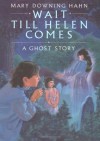Familiar Diversions
I'm a librarian who loves anime, manga, and reading a wide variety of genres.
Currently reading
The Kneebone Boy by Ellen Potter

The three Hardscrabble children, Otto, Lucia, and Max, live in the town of Little Trunks. For most of their lives they've been the "weird" children that everyone whispers about and no one wants to be friends with. Otto, the eldest Hardscrabble kid, began wearing a scarf on a daily basis after their mother disappeared. He also hasn't spoken a word aloud since then - instead, he invented a personal sign language that only Lucia knows fluently, Max can puzzle out, and their father can't hardly understand.
Lucia, the middle child, acts confident but is actually very lonely. Otto is her best and closest friend. Max, the youngest, is the most outgoing of the Hardscrabble children, but even his best efforts aren't enough to overcome the family's reputation and earn him a non-Hardscrabble friend. He's the most observant of the children, always carefully noting everything going on around him and thinking through what it all means.
The kids' father, Casper, paints deposed royalty. When he's suddenly called out to paint another portrait, he sends the children to stay with his cousin Angela in London. Unfortunately, Angela turns out to actually be on vacation elsewhere. The children really don't want to go back to Little Trunks, so they decide to go visit their Great-Aunt Haddie, who they've never met before. And so begins their adventure.
I had been wanting to read this for ages, almost entirely because I loved the cover artwork. I'm easily drawn in by illustrated covers. I knew very little about the story but assumed that it would have at least a few fantasy elements. This assumption was supported by the Goodreads users who tagged it as "Fantasy" and Potter's own writing, which kept hinting that fantastical things would happen. At the very least, there was supposed to be a ghost.
I'll just get this out of the way right now: I don't consider this to be a fantasy novel, and my expectation that it was probably hurt my opinion of the overall story. It's really more of a mixture of mystery and adventure.
The kids' desire to avoid going back to Little Trunks resulted in them accidentally investigating the mystery of their mother's disappearance. The way Potter wrote about Otto's quirks as being defense mechanisms was very intriguing and part of what kept me reading, even though the book's pacing and efforts at foreshadowing annoyed me. I also felt for Lucia, who both protected and depended upon Otto, and was grateful for Max, whose observations and deductions kept the story from lurching to a standstill.
The pacing, as I said, really didn't work for me. I was also a bit impatient with Potter's choice of narrator. The book was written as though it was a story being told by one of the Hardscrabble kids. The narrator never revealed their name, but various clues made it clear who it was. It was never clear to me why the author did things this way, and there were a few moments when I was distracted by thoughts of how surprisingly good this child seemed to be at guessing adults' ages. I don't know about you, but when I was as young as the Hardscrabble kids, my knowledge of adult ages was limited to "as old as my parents," "probably younger than my parents," and various levels of "pretty old."
It didn't take me too long to decide that I wasn't going to love this book, but, as the pieces of the Hardscrabble children's past started to come together, I did at least want to know how things would turn out. My first impression of the ending was that it was okay, but a bit dissatisfying. As I thought about it some more, however, I began to get angry.
First, what is up with stories in which parents
The Kneebone Boy had some good points. I liked the Hardscrabble children, and I thought the castle Haddie was staying at was pretty cool, even though the people who built it were awful. However, it took way too long for the book's focus to become apparent, and the more I think about the ending the more awful it feels.
(Original review posted on A Library Girl's Familiar Diversions.)












